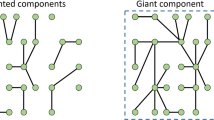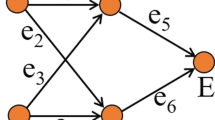Abstract
The paper is concerned with problems of management of economic processes characterized by difficulties in modeling the processes, uncertainty and dynamism of the environment, insufficient a priori observability and controllability, activeness of human factor, indeterminacy of consumers' economic behavior, and inconsistency in production and economic structures. These problems are solved through a combination of market mechanisms and goal-oriented management, including those that are based on self-organization (of economic factors) and creative techniques. The Krasovskii self-organizing regulators for optimal control of dynamic processes is shown to be applicable in economics.
Similar content being viewed by others
REFERENCES
Kamaev, V.D., Ekonomicheskaya teoriya. Uchebnik (Theory of Economics: A Textbook), Moscow: Tsentr VLADOS, 1998.
Eucken, W., Die Grundlagen der Nationalökonomie. Berlin: Springer, 1950. Translated under the tile Osnovnye printsipy ekonomicheskoi politiki, Moscow: Progress, 1995.
Put' v XXI vek: strategicheskie problemy i perspektivy rossiiskoi ekonomiki (Route to XXI Century: Strategies and Prospects of the Russian Economy), L'vov, D.S., Ed., Moscow: Ekonomika, 1999.
Leontiev, V., Ekonomicheskoe esse: Teoriya, issledovniya, fakty i politika (An Economic Essay: Theory, Research, Facts, and Policies), Moscow: Politizdat, 1990.
Oikhman, E.G. and Popov, E.V., Reinzhiniring biznesa: reinzhiniring organizatsii i informatsionnye tekhnologii (Business Reengineering: Organization Reengineering and Information Technologies), Moscow: Financy i Statistika, 1997.
Trenev, N.N., Strategicheskoe upravlenie predpriyatiem na osnove samoorganizatsii. Audit i finansovyi analiz (Strategic Company Management by Self-Organization. Auditing and Financial Report), Moscow: Izd. Dom “Komp'yuternyi Audit,” 1998, no. 1.
Fayol, H., Emerson, G., Taylor, F., and Ford, G. Upravlenie-eto nauka i iskusstvo (Management–Science and Art), Moscow: Respublika, 1992.
Tikhobaev, V.M., Regulirovanie balansovykh proportsii pri ogranichennoi nablyudaemosti sistemy (Regulation of Balanced Proportions under Restricted Observability of A System), Tula: TulPI, 1995.
Larichev, O.I., Teoriya i metody prinyatiya reshenii, a takzhe khronika sobytii v Volshebnykh stranakh (Theory and Decision Making Methods, and Chronicle of Events inWonderlands), Moscow: Logos, 2000.
Saridis, G.N., Self-Organizing Control of Stochastic Systems, New York: Marcel Dekker, 1977. Translated under the title Samoorganizuyushchiesya stokhasticheskie sistemy upravleniya, Moscow: Nauka, 1980.
Krasovskii, A.A., Bukov, V.N., and Shendrik, V.S., Universal'nye algoritmy optimal'nogo upravleniya nepreryvnymi protsessami (Universal Optimal Control Algorithms for Continuous Processes), Moscow: Nauka, 1977.
Krasovskii, A.A., Concept, Analytical Theory, and Algorithmic Software for a Two-Circuit Self-Organizing Regulator, Izv. Akad. Nauk. Teor. Sist. Upravlen., 1999, no. 4, pp. 52-64.
Krasovskii, A.A. and Naumov, A.I., Analytical Theory of Self-Organizing Control Systems with High Level of Artificial Intelligence, Izv. Akad. Nauk. Teor. Sist. Upravlen., 2001, no. 1, pp. 69-75.
Krasovskii, A.A., Modern Control Theory and Security Problems. Nauchnaya Mysl' Kavkaza, 1996, no. 2 (6), pp. 31-38.
Vanyurikhin, G.I. and Ivanov, V.M., Sintez sistem upravleniya dvizheniem nestatsionarnykh ob”ektov (Design of Control Systems for the Motion of Time-Varying Objects), Moscow: Mashinostroenie, 1988.
Krasovskii, A.A. and Bukov, V.N., Automatic and Automated Systems for Operator Training and Safety Problems, Izv. Akad. Nauk. Teor. Sist. Upravlen., 1996, no. 1, pp. 141-149.
Vanyurikhin, G.I., Economic Security?a Dynamic Problem. Company Security and the Self-Organization Principle, in Nauch.-prakt. konf. “Bezopasnost' i ekologiya Sankt-Peterburga” (Conf. Safety and Ecology, St. Petersburg), St. Petersburg: Nestor, 1998.
Vanyurikhin, G.I. and Chesnokova, S.V., Information Safety of an Enterprise, in VI Mezhdunar. konf. “Regional'naya informatika-98.” (IV Int. Conf. Regional Informatics 98) St. Petersburg: Poisu, 1998.
Author information
Authors and Affiliations
Rights and permissions
About this article
Cite this article
Vanyurikhin, G.I. Management of Economic Processes and the Krasovskii Self-Organization Principle. Automation and Remote Control 62, 1088–1096 (2001). https://doi.org/10.1023/A:1010205810059
Issue Date:
DOI: https://doi.org/10.1023/A:1010205810059




